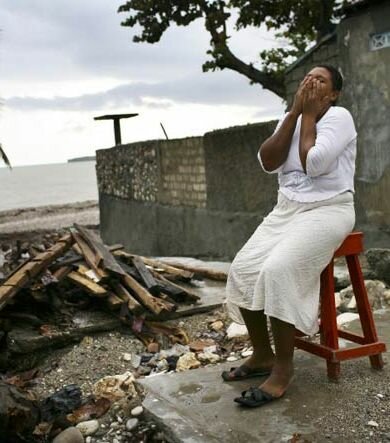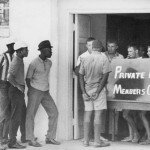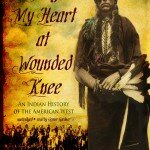Hell and hope
Haiti — By Bill Quigley on January 29, 2010 at 07:32Race-Talk contributor Bill Quigley is on the ground in Haiti his latest diary entry
Smoke and flames rose from the sidewalk. A white man took pictures. Slowing down, my breath left me. The fire was a corpse. Leg bones sticking out of the flames.
Port-au-Prince police headquarters is gone, already bulldozed. A nearby college is pancaked. Government buildings are destroyed. Stores fallen down. Tens of thousands of structures destroyed; hundreds of thousands homeless.
Giant piles of concrete, rebar, metal pipes, plastic pipes, doors and wires.
Corpses are still buried within the mountains of rubble. No estimates of how many thousands of people are dead inside.
Electrical poles bend over streets, held up by braids of thick black wires. On some side streets, the wires are still hanging down to the ground.
Buildings take unimaginable shapes. Some are halfway standing — one facade erect, the other sloping to the ground. Some have collapsed like cakes. Others, smashed like children’s toys.
Everywhere are sheet shelters. In parks, soccer fields, in the parking lot of the TV station, tens of thousands literally in the streets and on sidewalks.
Thousands of people standing in the hot sun waiting their turn. Outside the hospital are clinics, money transfer companies, immigration offices, and the very few places offering water or food.
Troops and heavy machinery are only seen in the center of the city.
After days in Port-au-Prince, I have seen only one fight — two teens fought on a streetcorner over a young woman. No riots. No machetes.
Hope is found in the people of Haiti. Despite having no electricity, little shelter, minimal food, and no real government or order, people are helping one another survive.
Men and boys are scavenging useful items from the mounds of fallen buildings. Women are selling mangoes and nuts on the street. Teens are playing with babies.
Beautiful hymns are lifted as choirs calling to God in every sheet camp, every evening. People pray constantly. The strikingly beautiful tap-tap cabs, brightly emblazoned with “In God We Trust” or “Merci Jesus.”
Everyone needs tents and food and medical care and water, but when you talk to people, most will lead you to an ailing great-grandma or the malnourished child — someone weaker, in even direr need of help.
What should outsiders do, I asked Lavarice Gaudin? Lavarice, who helps the St. Clare’s community feed thousands each day through their What If Foundation, said, “Help the most poor first. Some who labored their whole lives to make a one-bedroom home will likely never have a home again. Haiti needs everything. But we need it with a plan. Pressure the Haitian government; pressure USAID to help the poorest.”
International volunteers who work hand-in-hand with Haitians are welcomed. Others, not so much.
Lavarice saw the Associated Press story that reported only one penny of every US aid dollar will go directly in cash to needy Haitians. “I can understand that they distrust the government,” she said, “But why not distribute aid through the churches and good community organizations?”
And: “We hope this will help us develop strong leadership that listens and responds to the people.”
And: “No matter what, we will never give up. Haitians are strong, hopeful people. We will rebuild.”
Tags: earthquake, Hait Earthquake, Haiti, hope, Poverty, St. Clare, usaid, What If Foundation, World NewsAuthor: Bill Quigley (26 Articles)

Bill Quigley currently on the ground in Haiti recording a diary for Race-Talk. He is the Legal Director for the Center for Constitutional Rights, a national legal and educational organization dedicated to advancing and defending the rights guaranteed by the United States Constitution and the Universal Declaration of Human Rights. Bill joined CCR on sabbatical from his position as law professor and Director of the Law Clinic and the Gillis Long Poverty Law Center at Loyola University New Orleans. He has been an active public interest lawyer since 1977. He has served as counsel with a wide range of public interest organizations on issues including Katrina social justice issues, public housing, voting rights, death penalty, living wage, civil liberties, educational reform, constitutional rights and civil disobedience. Bill has litigated numerous cases with the NAACP Legal Defense and Educational Fund, Inc., the Advancement Project, and with the ACLU of Louisiana, for which he served as General Counsel for over 15 years. Bill received the 2006 Camille Gravel Civil Pro Bono Award from the Federal Bar Association New Orleans Chapter. Bill received the 2006 Stanford Law School National Public Service Award and the 2006 National Lawyers Guild Ernie Goodman award. He has also been an active volunteer lawyer with School of the Americas Watch and the Institute for Justice and Democracy in Haiti. Bill is the author of Ending Poverty As We Know It: Guaranteeing A Right to A Job At A Living Wage (2003) and Storms Still Raging: Katrina, New Orleans and Social Justice (2008). In 2003, he was named the Pope Paul VI National Teacher of Peace by Pax Christi USA and is the recipient of the 2004 SALT Teaching Award presented by the Society of American Law Teachers.



 Share This
Share This Tweet This
Tweet This Digg This
Digg This Save to delicious
Save to delicious Stumble it
Stumble it





 Grading President Obama’s freshman year as President
Grading President Obama’s freshman year as President A Regrettable Misunderstanding
A Regrettable Misunderstanding Dee Brown’s book on its 40th anniversary
Dee Brown’s book on its 40th anniversary In the Age of Obama?
In the Age of Obama?







